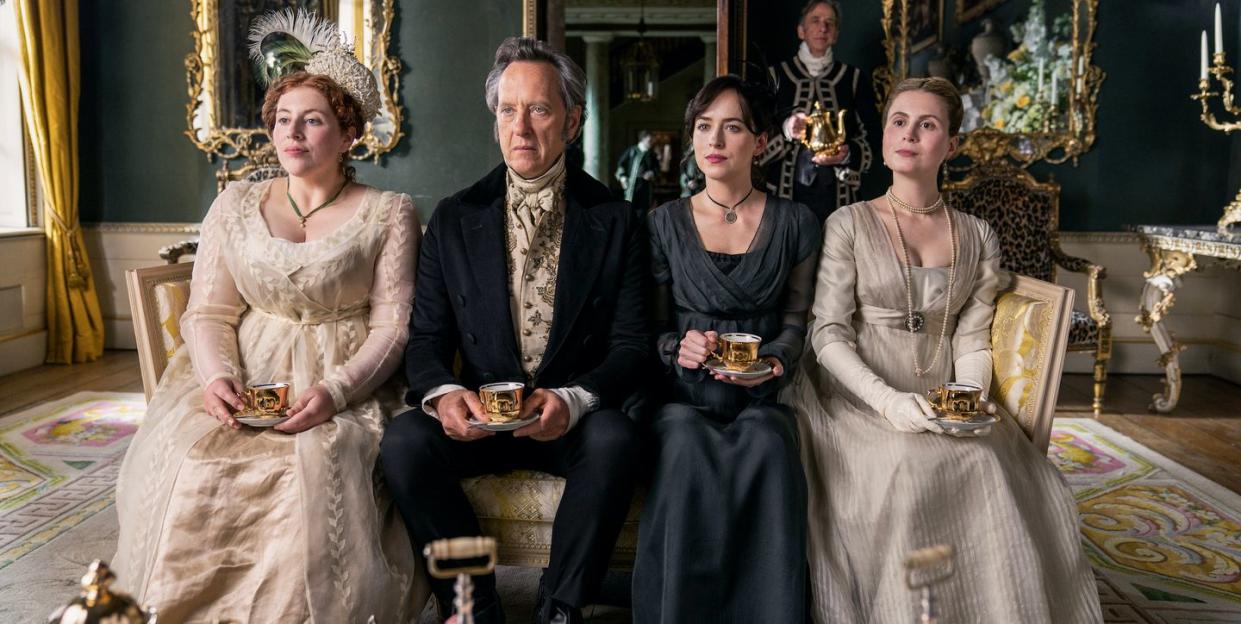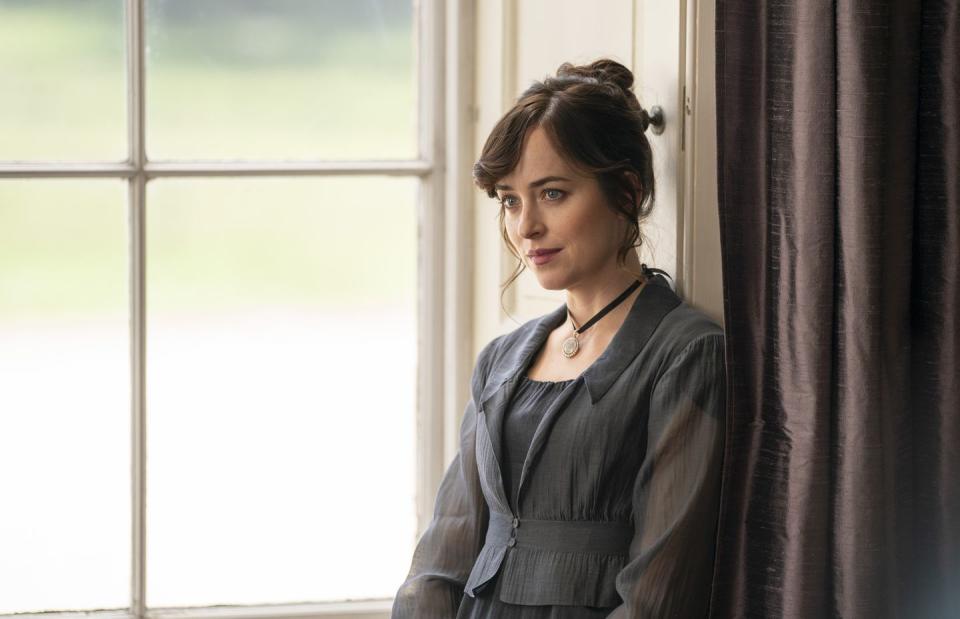Why Are People So Mad About Netflix's 'Persuasion'?

- Oops!Something went wrong.Please try again later.
- Oops!Something went wrong.Please try again later.
The rom-com-ification of period pieces has found its next victim in Jane Austen.
Netflix—the birthplace of today's premier yassified Regency-era heroines, also known as the protagonists of Bridgerton—just dropped the trailer for its adaptation of Persuasion, based on the last completed novel by the 19th-century writer.
Dakota Johnson stars as Anne Elliot, our leading lady who laments breaking off her engagement to an inconsequential naval officer, Frederick Wentworth (Cosmo Jarvis), at the behest of her vain family. Seven-plus years after their farewell, the former lovers are reunited. Wentworth, now a wealthy captain, returns to find Anne unmarried—practically a spinster at 27 years old. Chaos, of course, abounds. There are balls, trips to the sea, and a love triangle featuring one devilishly charming Henry Golding.
Netflix's take on the classic Austen tale is Fleabag meets empire waistlines; throughout, Anne exchanges knowing, tongue-in-cheek glances with the camera, breaking the fourth wall to wink at feelings of incredulity or schadenfreude. It's a fresh perspective from director Carrie Cracknell for her debut feature film, one that clearly leans into Austen's signature humor and satirical observations—traits often lost in so many of her novels' adaptations. It's also one that feels like an utter miscalculation of the story's true essence.
Anne, like all of Austen's heroines, is indeed a woman with biting wit and a keen eye for the societal impositions placed on her and others of her sex and station. But she's also a brooding wallflower, oft overlooked by her thankless family yet still motivated by duty and patience, devotion and gumption. With Wentworth's return, she is ever more introspective and penitent, being forced to quietly confront years of repressed regret and resentment over a love lost to familial piety.

Austenites are a tough crowd. Known to renounce any adaptation that isn't a faithful, sacred rendering of the source material (the bitter war over Joe Wright's 2005 take on Pride and Prejudice wages on to this day), they are unforgiving of interpretations that seem to favor consumer universality above historical accuracies. Unfortunately for them, quirky quasi-rom-coms on traditional Regency love stories seem to be on the rise as of late, if the Bridgerton boom is any indication.
The commercialization of a story as widely celebrated as Austen's most mature body of work has, at first glance, produced a cast of characters unrecognizable from their origins. Would Anne Elliot quip snarky, girlboss one-liners to a knowing audience? Would we even want her to? When we lose the beauty of subtext—Austen's greatest storytelling strength—what else exactly do we gain?
We get our answer when Johnson's Anne delivers a stunning line of dialogue during the two-and-a-half-minute trailer, seemingly translated from a passage in the novel about the incalculable despair of being estranged from a former lover: "Now we're worse than exes. We're friends."
Only time will tell if the rest of the adaptation falls to the same bewildering anachronisms as the trailer shows. But in the meantime, fellow Austenites on Twitter have gathered to commiserate.
me and the other girlies who’ve actually read persuasion: https://t.co/VNyxxXpCZQ pic.twitter.com/Zb4RZMu5RW
— now it’s a theory supremacist (@ghostsnymeria) June 14, 2022
Oh no the Persuasion remake thinks it can be wittier than Austen. Big mistake. Huge.
— Hillary Kelly (@HillaryKelly) June 14, 2022
I’m actually tearing up because Persuasion has some of the best writing in the English language and this is. Content.
— Brandon (@blgtylr) June 14, 2022
persuasion is about love and loss and ageing and responsibility and devotion it’s not a joke it’s serious pic.twitter.com/H8p3ITqXRt
— niamh (@niamhcullenn) June 14, 2022
Persuasion: ‘There’s power in being resilient, thoughtful and reserved; those qualities make you worthy of being a romantic hero’
Adaptation: ‘what if she’s sassy AND clumsy?’— Elisabeth Watts (@elisabethwatts) June 14, 2022
still can’t believe these people sat in a room and went “yeah let’s make persuasion a comedy” https://t.co/YoA6q4Zt2d
— n (@ceokimjisoos) June 14, 2022
Saying a prayer for everyone who hasn't read the book or seen the previous adaptations of Persuasion, who ends up loving this new version. You did nothing wrong.
— Rebekah Weatherspoon✨ (@RdotSpoon) June 14, 2022
You Might Also Like

